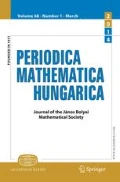Abstract
We investigate the repeated and sequential portfolio St. Petersburg games. For the repeated St. Petersburg game, we show an upper bound on the tail distribution, which implies a strong law for a truncation. Moreover, we consider the problem of limit distribution. For the sequential portfolio St. Petersburg game, we obtain tight asymptotic results for the growth rate of the game.
Similar content being viewed by others
References
A. Adler, Generalized one-sided laws of iterated logarithm for random variables barely with or without finite mean, J. Theoret. Probab., 3 (1990), 587–597.
D. Bernoulli, Exposition of a new theory on the measurement of risk, Econometrica, 22 (1954), 22–36 (Originally published in 1738; translated by L. Sommer).
L. Breiman, Optimal gambling systems for favorable games, Proc. Fourth Berkeley Symp. Math. Statist. Prob. 1, Univ. California Press, Berkeley, 1961, 65–78.
Y. S. Chow and H. Robbins, On sums of independent random variables with infinite moments and “fair” games, Proc. Nat. Acad. Sci. USA, 47 (1961), 330–335.
S. Csörgő, Rates of merge in generalized St. Petersburg games, Acta Sci. Math. (Szeged), 68 (2002), 815–847.
S. Csörgő, A szentpétervári paradoxon, Polygon, 5 (1995), 19–79, in Hungarian.
S. Csörgő, Merging asymptotic expansions in generalized St. Petersburg games, Acta Sci. Math. (Szeged), 73 (2007), 297–331.
S. Csörgő and R. Dodunekova, Limit theorems for the Petersburg game, Sums, Trimmed Sums and Extremes, Progress in Probability 23 (eds. M. G. Hahn, D. M. Mason and D. C. Weiner), Birkhäuser, Boston, 1991, 285–315.
S. Csörgő and P. Kevei, Merging asymptotic expansions for cooperative gamblers in generalized St. Petersburg games, Acta Math. Hungar., 121 (2008), 119–156.
S. Csörgő and Z. Megyesi, Merging to semistable laws, Theory Probab. Appl., 47 (2002), 17–33.
S. Csörgő and G. Simons, A strong law of large numbers for trimmed sums, with applications to generalized St. Petersburg games, Statist. Probab. Lett., 26 (1996), 65–73.
W. Feller, Note on the law of large numbers and “fair” games, Ann. Math. Statistics, 16 (1945), 301–304.
B. V. Gnedenko and A. N. Kolmogorov, Limit Distributions for Sums of Independent Random Variables, Addison-Wesley, Reading, Massachusetts, 1954.
L. Györfi and P. Kevei, St. Petersburg portfolio games, Proceedings of Algorithmic Learning Theory 2009 (eds. R. Gavaldà et al.), Lecture Notes in Artificial Intelligence 5809, Springer, 2009, 83–96.
J. L. Kelly, A new interpretation of information rate, Bell System Tech. J., 35 (1956), 917–926.
A. Martin-löf, A limit theorem which clarifies the “Petersburg paradox”, J. Appl. Probab., 22 (1985), 634–643.
Author information
Authors and Affiliations
Corresponding author
Additional information
Dedicated to Endre Csáki and Pál Révész on the occasion of their 75th birthdays
The work was supported in part by the Computer and Automation Research Institute of the Hungarian Academy of Sciences and by the PASCAL2 Network of Excellence under EC grant no. 216886 and by the Hungarian Scientific Research Fund, Grant T-048360.
Rights and permissions
About this article
Cite this article
Györfi, L., Kevei, P. On the rate of convergence of the St. Petersburg game. Period Math Hung 62, 13–37 (2011). https://doi.org/10.1007/s10998-011-5013-3
Received:
Accepted:
Published:
Issue Date:
DOI: https://doi.org/10.1007/s10998-011-5013-3



